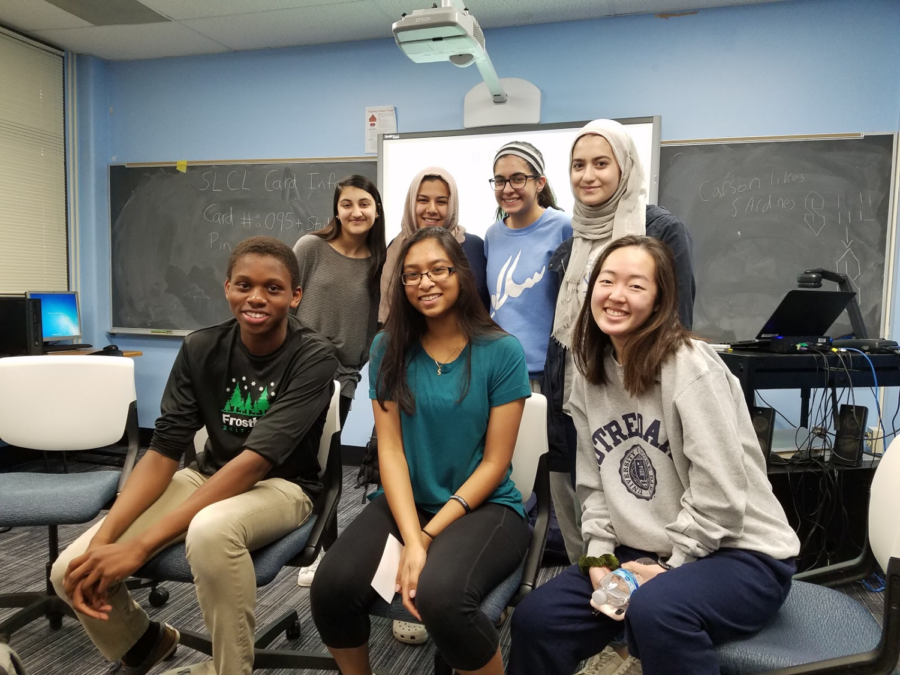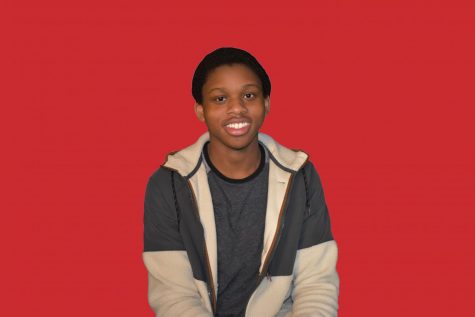After listening and engaging in a student panel discussion April 24 to increase cultural and religious awareness, science teacher Amy Cohen, assistant principal Beth Middendorf and journalism teacher Debra Klevens hope to let minority students voice their opinion to break stereotypes.
In their aspiration for global competency, Cohen, Middendorf and Klevens want to give teachers the opportunity to hear minority students express their feelings and talk about their experiences at school.
“We are part of a district initiative called Global Competency Cohort, and this year we decided we wanted to start with the staff and helping the staff become more aware of what diversity in our school looks like, particularly from the international community,” Cohen said. “In March, we showed a video highlighting certain students. This panel was a follow-up to give staff a chance to have more personal conversations with certain students that wanted to share their opinions, perspectives and views.”
Because of the panel discussion, sophomore Salma Ahmed believes that this could lead to change.
“This is a big step because it allows us to have a voice in the community so that we have strength to make a change because there are things that we’ve always felt upset about, but we’ve always held it in,” Ahmed said. “Now that we were able to voice our concerns, they’re aware of it so they can take a step into it so that they can do something about it.”
Although these issues may not be as pertinent and relatable to others, Cohen hopes to bring awareness to the diverse population of students.
“We have a lot of diversity in our school, and there is value in diversity. There are different ways at looking at diversity, and I think sometimes international communities work so hard at trying to assimilate, in this case, ‘The American West County Culture,’ that sometimes students and families lose part of their identity,” Cohen said. “I think this is a way for families to feel welcomed and included and celebrate who they are and what they can bring to our school.”
Given that Cohen feels that teachers and staff need to be more educated about cultural and religious views, she thinks that the student panel was a healthy start to seeing some change.
“There is definitely an interest from the staff [of] wanting to know more and particularly wanting to figure out how we can be more inclusive of our students. The teachers and the staff that were there really liked learning. They liked to ask questions and learn more about students’ backgrounds both from the religious standpoint and from their nationality standpoint,” Cohen said. “They also had a chance to ask about things that they’ve been worried about from a teacher perspective: ‘How do I handle it if I don’t pronounce a student’s name correctly? [or] what is the appropriate way to approach a parent if we think their cultural tradition would mean that we shouldn’t shake their hand?’ Teachers and staff clearly want to make sure they are being respectful and they are being supportive, and I think this was a good way to start that conversation.”
Likewise, junior Anjali Kumar found it effective to be able to speak up about minority students’ experiences in the classroom.
“I thought that it was really helpful,” Kumar said. “One of the questions was [when biology teacher Sally] Soulier asked if she should start teaching how skin color actually comes to be, like the biology behind [it] because there are so many misconceptions. I thought that was really cool because teachers actually want to teach whatever lesson they’re using but bring in diversity and global awareness into it. [These] teachers interact with students on a daily basis, so it’s important to know if they say something that’s offending someone. I know [with] some religions, people need to pray throughout the day, so if they have a lack of understanding on why a student needs to do that, they [need to] have more awareness.”
Additionally, Cohen believes that the student panel discussion has set up a strong foundation for the future.
“We’re looking forward to seeing the panel grow next year and coming up with different ways staff and students can interact on this topic. For me, this is very exciting,” Cohen said. “This is my second year in this group and to see more people in the community get behind this initiative and realize that it’s important makes me excited for the future.”
As a result of hosting the discussion, Cohen has taken many initiatives to execute their mission.
“Some of the staff and I have already been in discussion with Dr. Mitchell on what we can do to support our Muslim students who will be observing Ramadan next week and ways that we can help the staff be more aware of what that means,” Cohen said. “That is an immediate result of that conversation, and we’ll see what else we can do. I know there was discussion of perhaps having an international night or an opportunity during teacher professional development [days] for more teachers to interact with students. There was also another suggestion that there would be a section in the Pathfinder where international students can have an opportunity to be highlighted and help bring awareness to the student body. There is certainly the potential for lots of exciting things to happen in the future.”
After having established the Global Competency Cohort in the West community, Cohen hopes to extend that success to other Parkway schools.
“I know that I’ll be talking with the people of the district and with some of the other high schools to see what they’re doing,” Cohen said. “So perhaps we can all collaborate together and move forward with a district mission of the different things that the high schools are going to do and hopefully after that move down to the middle schools and the elementary schools.”
In essence, Kumar feels that this would enhance relationships between students and teachers.
“Teachers need to be more aware that there is a diverse population at West, and different students need different things from the teachers in order to be successful at school,” Kumar said. “I think it would be a way more collaborative setting where people are more comfortable talking with different people.”




![Smiling in a sea of Longhorns, Fox 2 reporter Ty Hawkins joins junior Darren Young during the morning Oct. 3 pep rally. The last time West was featured in this segment was 2011. “[I hope people see this and think] if you come to [Parkway] West, you will have the time of your life because there are so many fun activities to do that make it feel like you belong here. I was surprised so many people attended, but it was a lot of fun,” Young said.](https://pwestpathfinder.com/wp-content/uploads/2025/10/Edited2-1200x798.jpg)
![West High seniors and families listen as a representative of The Scholarship Foundation of St. Louis, Teresa Steinkamp, leads a Free Application for Federal Student Aid (FAFSA) workshop. This session, held in the library, provided guidance on financial aid, scholarships and student loan options. “This event is very beneficial for any seniors who are applying to or considering applying to colleges after high school [because] the cost of college is on the rise for seniors and parents,” college and career counselor Chris Lorenz said.](https://pwestpathfinder.com/wp-content/uploads/2025/09/DSC_4478-1200x778.jpg)
![Senior Kamori Berry walks across the field during halftime at the Homecoming football game on Sept. 12. During the pep assembly earlier that day, she was pronounced Homecoming Queen. “I thought it was nice that the crowd [started] cheering right away. I know [my friends] were really excited for me, and my family was happy because typically non-white people don't win,” Berry said.](https://pwestpathfinder.com/wp-content/uploads/2025/09/DSC7046-Enhanced-NR-1200x798.jpg)



![Pitching the ball on Apr. 14, senior Henry Wild and his team play against Belleville East. Wild was named scholar athlete of the year by St. Louis Post-Dispatch after maintaining a high cumulative GPA and staying involved with athletics for all of high school. “It’s an amazing honor. I feel very blessed to have the opportunity to represent my school [and] what [it] stands for,” Wild said.](https://pwestpathfinder.com/wp-content/uploads/2025/05/unnamed-6-1200x714.jpg)
![The Glory of Missouri award recipients stand with their certificates after finding out which virtue they were chosen to represent. When discovering their virtues, some recipients were met with contented confirmation, while others, complete surprise. “I was not at all surprised to get Truth. I discussed that with some of the other people who were getting the awards as well, and that came up as something I might get. Being in journalism, [Fellowship of Christian Athletes and] Speech and Debate, there's a culture of really caring about truth as a principle that I've tried to contribute to as well. I was very glad; [Truth] was a great one to get,” senior Will Gonsior said.](https://pwestpathfinder.com/wp-content/uploads/2025/04/Group-Glory-of-Missouri.jpg)


Zainab Oyebamiji • May 25, 2019 at 4:29 am
This initiative is much needed for minority and the majority alike. As we can overcome any barriers with constructive conversation even on sensitive topics that address our differences. This is a way forward for the West community. Way to go kidos!